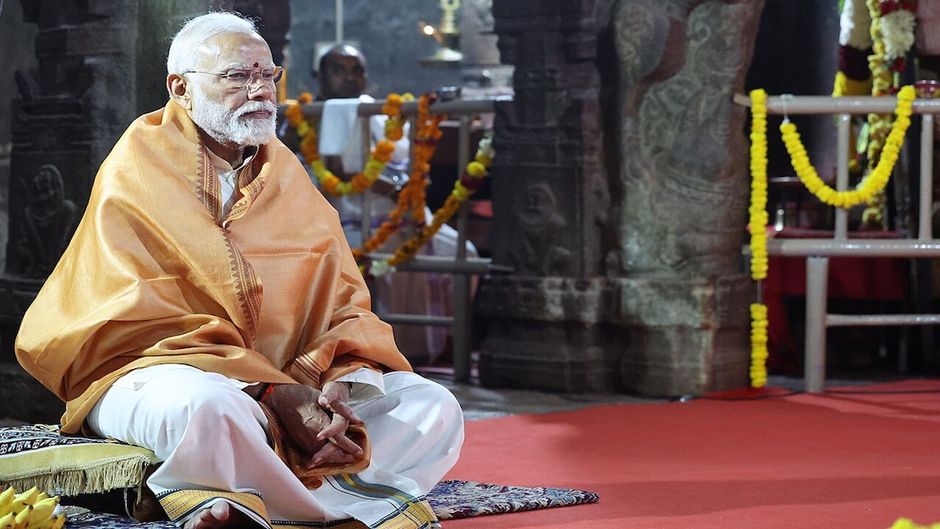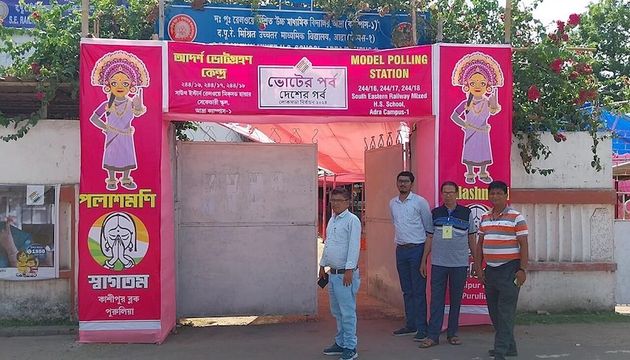India’s “unexpected results” deflate Hindu nationalism, evangelicals unsure about effect on minorities
The coalition led by prime minister Narendra Modi still has a majority but failed in its expectations after losing 67 seats. “For many Christians, the loss brings a sense of relief”.
Protestante Digital · NEW DELHI · 20 JUNE 2024 · 17:46 CET

Against all odds, including prime minister Narendra Modi's prediction that his Indian People's Party (BJP) would win 370 seats, the governing party lost 50 seats and the absolute majority needed to form a new Lok Sabha (Parliament).
However, the BJP and Modi, which are part of an alliance of Hindu nationalist parties, will be able to continue in government for another five years, as the National Democratic Alliance (NDA) coalition has a total of 293 seats out of 543 in India's parliament.
Yet, the figure represents a loss of up to 67 representatives compared to the last election.
Modi, who would be in power in India for 15 years if he completes a third term, presented himself in the campaign as a key figure for the more extremist nationalist and Hindu sectors, often speaking about his faith and even celebrating the inauguration of a temple as if he were a priest.
“People have shown immense faith in the NDA coalition for the third time”, Modi told the media after the results were announced.
Leading the opposition will be the restored Indian National Congress, which has won 50 more seats, and his INDIA coalition, which has a total of 234 MPs, 115 seats more than in 2019.
A historic shift
International headlines have labelled the results as a setback for Modi and his political program.
After 10 years in government and winning up to 360 seats (with the NDA coalition) in 2019, “the recent elections in India are a historic shift with unexpected results”, Vijayesh Lal, general secretary of the Evangelical Fellowship of India (EFI), told Spanish news website Protestante Digital.
“Despite the confidence and predictions of the exit polls, the BJP only won 240 seats, below the 303 in 2019, while the opposition INDIA coalition, led by the Indian National Congress, won 234”, he said.
However, for Lal, as for many others, it is inevitable to think that Modi has managed to re-validate his position as prime minister, for the third time. “A feat only achieved by one prime minister: Jawaharlal Nehru”, he pointed out, referring to the country's first political leader after independence from the United Kingdom.
According to the evangelical representative, “Modi must now lead a coalition government, while the strengthening of the opposition offers a more competitive political scene”.
Lal believes that “for many Christians, the loss of the BJP brings a sense of relief and cautious optimism”, since “the Modi administration, known for its Hindu nationalist agenda, has often marginalised religious minorities, who have been concerned about their rights and safety”.
The Evangelical Fellowship of India monitors religious persecution through its Religious Liberty Commission (RLC) and claims that its latest reports indicate an increase in the persecution of Christians, with over 600 incidents in 2023.

Dying of success?
Narendra Modi's alliance of parties and his increasing control over the judicial institutions, economic elites and the media in the country in recent years seems not to have helped to convince a large part of the population.
“The decline of the BJP stemmed from the disillusionment of its core voters over issues such as unemployment and threats to Indian secularism”, underlines Lal. “Its close ties with business and its dominance of the media have also caused a disconnect with public sentiment”, he adds.
Furthermore, India was one of the countries most devastated by the Covid-19 pandemic, a scenario that also highlighted the inequalities between religious groups in the country.
In addition to this scenario, there is less fragmentation in the Lok Sabha, with the “other parties” group getting only 16 seats, compared to 64 in 2019, a fact that may make it difficult for the Modi government to extend its political support.
“A little more air to breathe”
The declining representation of Hindu nationalism in Indian politics, “could make it more difficult for the government to target religious minorities and human rights activists, potentially easing the release of wrongfully detained Christians and activists”, Lal told this website.
It is also possible that “the non-governmental sector affected by the denial and cancellation of FCRA (foreign funding regulation) accounts may also possibly be less targeted. But we don't know for sure”, he adds.
The EFI secretary general sees it as “ess likely” that “hate crimes committed by non-state actors will decrease, as hatred has seeped in too deep and Indian society has become polarised around religious issues”.
For Vijayesh Lal, it is impossible to ignore the fact that the Rashtriya Swayamsevak Sangh (the National Volunteer Organisation), which is one of the most extreme Hindu nationalist groups in the country, has “a massive reacht” in India and has many affiliated groups across the country.
“They can learn from this defeat and strengthen their structures, which may lead to increased violence against religious minorities”, he said.
For the moment, this indigenous Christian leader can comfort himself with the idea that “the average Indian committed to the founding ideals of India is happy that the nation has turned from authoritarianism to a hopefully more inclusive form of government”.
“It's like getting a little more space to breathe. As one political commentator put it, the lok (people) have triumphed over the tantra (system) for once. Let's savour it while it lasts”, concluded Lal.
One more year
Learn all about our #OneMoreYearEF campaign here (English).
Published in: Evangelical Focus - world - India’s “unexpected results” deflate Hindu nationalism, evangelicals unsure about effect on minorities
